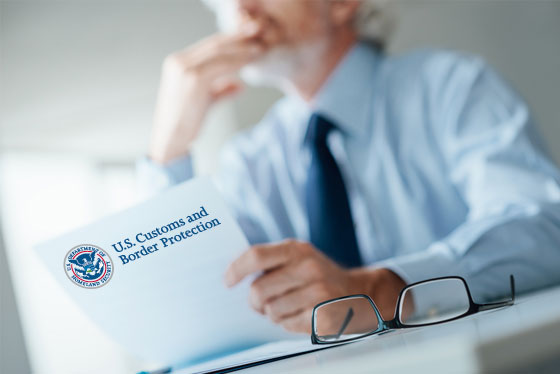
If you’ve recently received a letter from U.S. Customs & Border Protection (CBP) with the seemingly mundane subject line, “Distribution of Informed Compliance Publications and Other Informative Documents,” sit up and take note—your company may be at risk for a CBP audit or investigation.
A reliable source close to Mohawk Global Trade Advisors has informed us that CBP’s Office of Regulatory Audit in Houston is issuing such letters to the top 1000 U.S. importers.
What’s in these letters?
Although each letter is different, they all mention
- that as part of CBP’s responsibility for Informed Compliance (under the Mod Act), they are providing information to your company to ensure future compliance;
- a specially selected list, specific to your company, of Informed Compliance Publications—guides for the trade, written by and available for download from CBP, which cover general compliance topics, such as recordkeeping, the Valuation Encyclopedia (which was updated in 2015), and rules of origin, as well as specific commodities, such as ball bearings, gaskets and textiles;
- 19 USC § 1592(c)(4), Penalties for fraud, gross negligence, and negligence, and 19 CFR §162.74, Prior disclosure. The letter does not require an importer to make a Prior Disclosure, but if an importer elects to do so, penalties may be reduced under certain circumstances;
- since CBP has provided this information, future violations could result in seizure, forfeiture, and/or monetary penalties;
- and, a request for the signature of a “responsible official” to acknowledge receipt of the items listed in the letter.
Why are these letters being issued?
First, it’s important to understand that these letters are not being issued arbitrarily. Importers who receive these letters are at risk for a CBP audit or investigation. It’s also important to note that the Informed Compliance Publications listed in the letter are not random; out of the 95 listed on their website, CBP has identified those with topics that relate to your transactions. You’ll need to carefully examine these areas.
Recommended steps for your organization
Based on the details available for these Informed Compliance Publication letters, there are some recommended steps that your organization can take.
- Do not assume that participation in the Importer Self Assessment (ISA) program excludes you from audits related to these letters.
Even if you are an ISA participant, and had been taken out of the audit pool, you are not excluded from this new targeting pool. - Determine how likely it is for your company to receive such a letter.
Our sources tell us that CBP is currently mailing letters to companies in the top 1000 U.S. importers. Although no list of the top 1000 exists, CBP has published a list of the top 5000, which can be found at: https://www.cbp.gov/document/top-5000. Finding your company on this list may indicate if there is potential for you to receive the letter.
If you receive a letter, here are some recommendations for your organization to take.
Review data in your ACE portal based on the topics of the Informed Compliance Publications indicated in the letter.
There are many reports available in ACE that allow you to review discrepancies, HTS, exam results, free trade agreements, and entry summaries. The first ten pages of the ACE Portal Reports Dictionary for Importers provide a summary of reports and information they contain. And while you’re in the ACE portal, confirm that your company information is up to date.
Find out when your company last did a risk assessment or gap analysis.
The assessment/analysis should have included:
- whether you have a written compliance manual and if your employees know where it is and how to use it
- if any of your imports are the subject of Priority Trade Issues, such as antidumping/countervailing, free trade agreements, textiles, or related party transactions (valuation)
- the number of post entry corrections made and Prior Disclosures submitted since your last analysis
- whether you’ve received any Requests for Information (CBP 28s/29s) or communication from the Centers of Excellence and Expertise (CEE)
Give careful consideration as to whether the letter should be signed.
Be aware that potential liability for violations may increase after the letter is signed. Should your company wish to prepare a reply that may reduce the risk of an audit, the following approach is recommended.
- Start by utilizing the services of a consultant or Customs attorney who can provide guidance and best practices.
- Before you respond, review and understand the issues related to any Requests for Information (CBP 28s/29s), and if pertinent, any Centers of Excellence and Expertise (CEE) correspondence; as well as take a close look at internal audits and post entry reviews to understand the results, observations, and required process improvements.
- When composing your response, if your company filed a Prior Disclosure before receiving the letter, advise CBP that you are already reviewing these areas, have done your due diligence, etc.
One final important consideration: who in your organization will get this letter? Will it languish in the mail room because no one knows what it is or where it should go? Will it sit on the desk of someone in the accounting department for weeks before it is even opened? You can decrease the chances of these scenarios by asking your staff to send any documentation with a CBP logo or return address to the appropriate party as soon as possible.
Do you need guidance on an Informed Compliance Publication letter you received? We can help. Contact Mohawk Global Trade Advisors and ask for assistance with your letter.
By Adrienne Graddy, Senior Advisor

